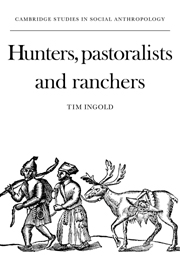Book contents
- Frontmatter
- Contents
- List of figures and tables
- Preface
- Prologue: On reindeer and men
- 1 Predation and protection
- 2 Taming, herding and breeding
- 3 Modes of production (1): hunting to pastoralism
- 4 Modes of production (2): pastoralism to ranching
- Epilogue: On band organization, leadership and ideology
- Locations of circumboreal peoples
- Appendix: The names and locations of circumboreal peoples
- Notes
- Bibliography
- Author index
- Subject index
3 - Modes of production (1): hunting to pastoralism
Published online by Cambridge University Press: 12 September 2009
- Frontmatter
- Contents
- List of figures and tables
- Preface
- Prologue: On reindeer and men
- 1 Predation and protection
- 2 Taming, herding and breeding
- 3 Modes of production (1): hunting to pastoralism
- 4 Modes of production (2): pastoralism to ranching
- Epilogue: On band organization, leadership and ideology
- Locations of circumboreal peoples
- Appendix: The names and locations of circumboreal peoples
- Notes
- Bibliography
- Author index
- Subject index
Summary
The intensity of sharing in hunting societies
Hunting is not merely something that men do to animals. It also denotes a kind of social structure which rests on the negative premise, simply stated, that unharvested resources do not constitute a form of property. The contrast with pastoralism is absolute: ‘pastoralists recognize rights over live animals, hunters over dead ones’ (Ingold 1975:619). Pastoral animals constitute the objects of social relations of production and distribution from the moment of their birth, hunted animals from the moment of their death. It follows that animal resources can become vehicles of enduring social relations in a pastoral society in a way that they cannot in a hunting society, for in the former case such relations can be perpetuated through successive generations in the herd, whilst in the latter case they can persist only through the interval of time between the killing of an animal and its final consumption. Since harvested animals, unlike a plant crop, will not reproduce, the multiplicative accumulation of material wealth is not possible within the framework of hunting relations of production. Indeed, what is most characteristic of hunting societies everywhere is the emphasis not on accumulation but on its obverse: the sharing of the kill, to varying degrees, amongst all those associated with the hunter.
- Type
- Chapter
- Information
- Hunters, Pastoralists and RanchersReindeer Economies and their Transformations, pp. 144 - 200Publisher: Cambridge University PressPrint publication year: 1980



